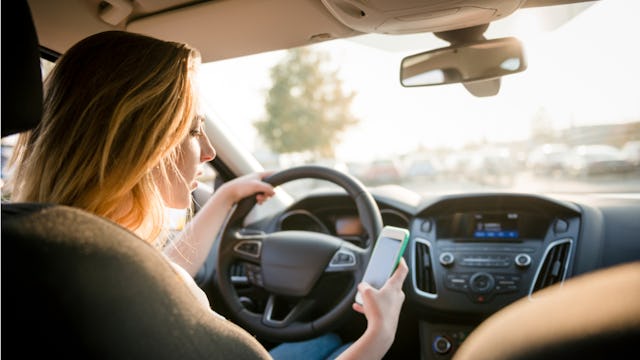The Dangers Of Distracted Driving Are Real (And Go Beyond Texting)

I am fiercely diligent when it comes to not texting and driving. In addition to not wanting to die or to kill someone, I have two teen girls, one of whom has her driver’s permit. I want to be absolutely sure I’m being a good example of non-distracted driving. If I really need to read or send a text, I’ll pull off the road and stop first, or I ask one of the kids to read or send it for me.
But as conscientious as I am about texting and driving, I’ve recently realized I have some other habits that fall under the distracted driving umbrella. I’ll pick up the phone at red lights to change my Spotify station. I eat while I’m driving all the time. I don’t know why, but I love to drink coffee while driving.
I’m also constantly handing things to my kids in the back seat and peeking into the rearview mirror to referee all manner of kid shenanigans. If distracted driving is a problem (which we all know it is), then parents are likely the worst culprits — even without a cellphone in sight.
My home state of Washington recently enacted a new distracted driving law that has raised some people’s hackles. The law forbids using virtually all handheld devices while driving. That seems like a no-brainer to me, but considering the fact that state observation teams have found that 1 in 10 drivers is using a handheld device at any given time speaks to the need for it. Oddly, you can still have the phone up on the dashboard in a cradle and use your finger for navigating. You just can’t do anything while holding the phone — even when stopped at a red light.
The law also makes eating and drinking a “secondary offense,” meaning that you won’t get pulled over solely for doing those things, but if you get pulled over for something else you can get cited for eating or drinking while driving.
I know some folks see such rules as going too far, as encroaching on our rights in some way. But the way I figure it, my rights don’t outweigh other people’s right to safety. If my cheeseburger falls apart while I’m eating, and I look down to clean the pickles and ketchup off my lap, and in that split-second I rear-end someone, my eating that cheeseburger is logically what led to the crash. Most of the time, eating and drinking while I’m driving isn’t that distracting, but I can see how it has the potential to be.
And distracted driving can be deadly. In 2015, more than 3,400 people died in car accidents caused by distracted drivers. Presumably, many of those deaths were caused by cellphone use. Texting takes people’s eyes off the road for an average of five seconds. At freeway speeds, that’s the equivalent of driving the length of a football field with your eyes closed. That is terrifying.
And though teens are the group most likely to be texting while driving, I’ve seen plenty of people my age (40-ish) distracted by their phones. This not an issue reserved for the young.
The bottom line is that driving is about the most dangerous thing most of us do on a regular basis, even without the addition of extra distractions. Auto accidents can and do happen in seconds. Too many of us have a false sense of safety at certain times, like when we’re driving on a slow, residential road.
Think of this: If two cars are traveling opposite directions at 20 miles per hour and one swerves into the other head on, that’s the equivalent impact of driving into a wall at 40 miles per hour. How easily could that happen right in your own neighborhood? Alternatively, the steady speed and lack of intersections on the freeway can also lull us into a sense of security, making us forget that a crash of any kind at 60 or 70 miles per hour is inevitably ugly.
No one ever thinks they’re going to get into an accident though. People think they’re good enough drivers to be able to glance down for a second or two to read a text or to choose a different song on their music app. But it’s far too easy for a second to turn into three or five. And no matter how good a driver you are, you can’t control what other people are doing on the road. You can’t control the child or animal that runs in front of your car. You can’t make the car in front of you not slam on its brakes.
Driving, especially with kids, already has enough built-in distractions. Let’s keep the road safer for everyone by keeping our hands and heads engaged in maneuvering our 4,000-pound vehicles and save the phone use and other added distractions for later. The risks simply aren’t worth it.